| Return to main page |
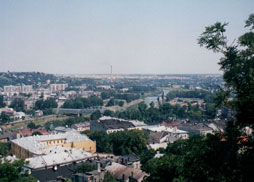 |
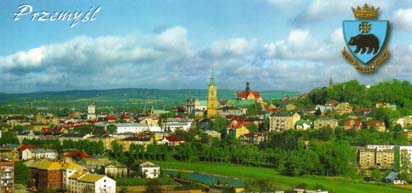 |
Figure 62: General views of Przemysl, (i) east to west, (ii) west to east
They awoke early the next morning, feeling much better thanks to the youth hostel's hot water and clean sheets. Their first destination was the bazar. 'It's much less lively than it used to be in the first years after the collapse of communism,' said Dr. Dylagowa. 'In those days we had traders flooding in from almost every corner of the old Soviet Union and the trading was utterly chaotic. As you can see it's much more regulated now, and this sports stadium is given over to individual commerce during the summer months. These are basically poor people with very little to sell. The more successful dealers don't sit out here in the heat and dirt. They find Polish partners, who sell their goods in small shops or distribute it through their own informal networks. As you can imagine, it's a slightly tricky area to do research in, and you often hear the word mafia. But there doesn't seem to be any serious crime associated with this bazar. It is viewed positively by almost everyone in the city, because it has been an economic lifeline. Remember, here too lots of people lost their jobs when capitalism was introduced, and this outlet was very important for their survival strategies.'
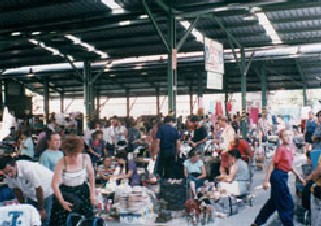 |
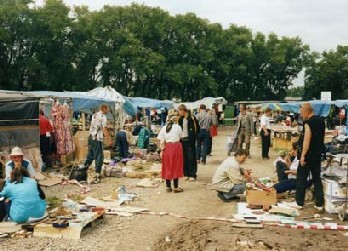 |
Figure 63: The Bazar in Przemysl, (i) covered zone, (ii) outdoor zone
Accompanied by a locally based historian, with whom the professor was evidently on very good terms,Tom interviewed several traders, including a lady who hastily covered her face when he tried to take her picture. He wanted to know what had driven them to come to Przemysl and what sort of financial gains they expected. Some gave very specific answers, others found it difficult to specify any figures at all. Some emphasized that their motivation was solely material, since any money they could earn on this bazar would be of enormous help to them back home. But Tom was surprised when about half of his interviewees, of all ages, stressed other motivations: they were combining their market activity with some tourism in the region, or their main purpose was to visit some relatives and the time spent on the bazar was secondary. Some young women said that it was 'fun', and much more interesting than their usual summer visits to the Black Sea coast.
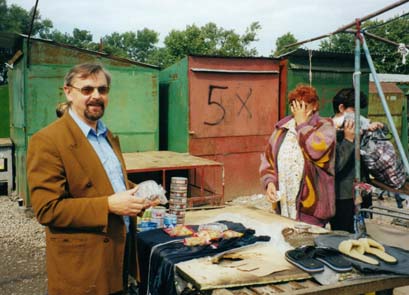
Figure 64: A trader reluctant to face the camera
The machine tools and spare parts for ex-communist cars were of little interest to the students. Tom was keen to buy himself a leather jacket, so he wandered off alone to explore that part of the bazar. Here he bumped into the familiar faces of Maria and Wlodek, who had just arrived to spend a long weekend in their home town. Wlodek introduced Jarek, his cousin from a village just across the Ukrainian border. Jarek's father had excellent trading connections all the way to Istanbul, Odessa and Central Asia. He had put his teenaged son in charge of the Polish retailing end of his operations, taking advantage of the free accommodation that Jarek received from Wlodek's parents. Jarek promised to make Tom the best jacket offer imaginable. Tom tried on several, Ania appeared to give her approval, and a deal was quickly clinched. 'Come to our house on Sunday,' said Wlodek. 'No, my parents will insist that you come to our place,' said Maria. 'They have to hear all the news from Chicago.' 'First we'll have to see what our Professor is planning for us,' said Tom. 'Couldn't we all meet together somewhere?' The faces of Maria and Wlodek told him that this was not an option.
After the bazar they called on the city council's Development Officer, who delivered a short speech that he had evidently given many times already. Overall the town had adapted well to post-communist challenges. The official was particularly enthusiastic about the grants that had been received from a variety of sources to promote cross-border contacts, not only with Ukraine but also with cities in Slovakia, Hungary and Romania, all of which were closer to Przemysl than the Polish capital. He admitted, however, in answer to a question from the Professor, that the economic activity resulting from these grants and associated NGO activities was small in comparison to that which had developed spontaneously and informally after the relaxation of border controls, and which they had just been able to see at the bazar. And, yes, unemployment was a serious problem in the city, and it might even worsen if entry into the European Union brought with it a stricter policy of border controls.
| Return to main page |